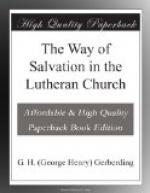Some time ago we were asked, by a minister of another denomination, why Lutherans retained and practiced Romish confession, and forgiveness by the minister. We gave him our formula for Confession and Absolution, and asked him to examine it and point out to us wherein it was Romish or unscriptural. After examination he handed it back, saying: “I cannot say that it is exactly unscriptural. In fact, I can easily see how you can quote Scripture in its defense.”
And so we can. In Matt. xvi. 19, Jesus says to Peter: "I will give unto thee the keys of the kingdom of heaven: and whatsoever thou shalt bind on earth shalt be bound in heaven; and whatsoever thou shall loose on earth shall be loosed in heaven." In Matt. xviii. 18, the Saviour gives the same power in the same words to all the disciples as representatives of the Christian congregation. In John xx. 21-23, He says again to the disciples: "As my Father hath sent me, even so send I you, ... whosesoever sins ye remit, they are remitted unto them, and whosesoever sins ye retain, they are retained."
What do these words of Christ mean? They must mean something. They must be of some use. Our Lord certainly does confer some kind of authority or power on His Church, which is His Bride. Does He hereby give into her hand the keys of His kingdom, and authorize her to dispense its treasures? Does she, through her ministry, employ these keys, bring forth heavenly treasures, and distribute and withhold them among the children of men? To the Church’s ministers Christ says, Luke x. 16; "He that heareth you, heareth Me: and he that despiseth you, despiseth me." One of these ministers, who certainly understood his office and its prerogatives, speaking in the name of all true ministers of Christ, says, 2 Cor. v. 20: "Now then we are ambassadors for Christ, as though God did beseech you by us, we pray you in Christ’s stead, be ye reconciled to God." If we would see how this ambassador exercised his high authority in an individual case, he tells us in 2 Cor. ii. 10: "If I forgave anything, to whom I forgave it for your sakes forgave I it, in the person of Christ."
If now we take these passages together, we must admit that in their plain literal sense; they do teach that Christ, the Head of the Church, has in some sense committed to His Church the power to remit and retain sins, and that this power is exercised in the Church through its ministry.
In what sense then has a minister power to remit sin? Certainly not by any inherent virtue of his own, nor by any power originating in his own person. In this sense only God can forgive sin, as all sin is committed against Him. But God can delegate that power to another, and permit him to use it in His name. And this is all the power any human being can have in this matter. It would indeed be blasphemy for any man to claim that he had power in himself to forgive sins. If he can




